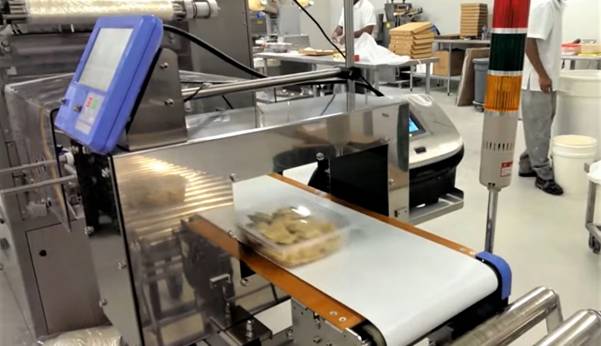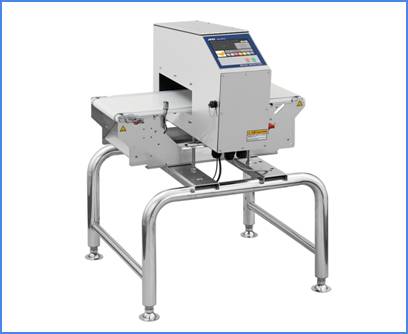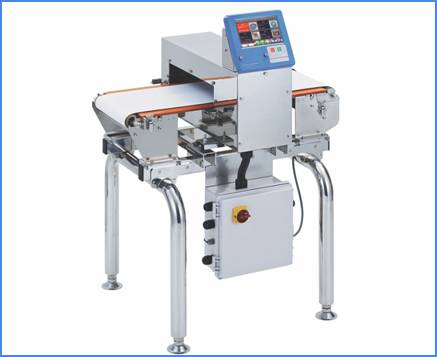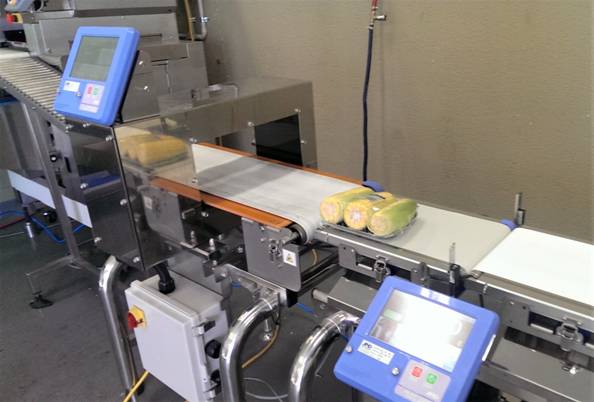Food Safety is a crucial concern for consumers and food manufacturers today. Australian food standards and regulations are world class, and most food manufacturers do everything possible to avoid all types of contamination to produce safe products for sale.
Occasionally however, food contamination can occur whether it be biological, chemical, allergenic or physical. In terms of physical contamination in the food production, metal is one of the most commonly found contaminant materials.
Metal can be introduced at different stages of production, as it is heavily used in food processing machinery, handling equipment as well as supplementary tools and utensils.
Why is Metal Detection Crucial for the Food & Beverage Industry?
There are three main types of metallic contaminants that a food metal detector can sense: Ferrous (mild steel / cast iron), non-ferrous (lead / copper / aluminum), and stainless steel. All these metals have distinct magnetic conductive properties and can be detected to varying degrees using metal detectors.
Ferrous metals containing iron are generally the easiest to detect because of their strong magnetic properties. Conversely, non-ferrous metals which lack iron are not magnetic but they still have high conductive properties, making them fairly easy to detect as well.
The presence of stainless steel in food is usually the most challenging to detect as it is non-magnetic and has poor conductivity.
Environmental and product conditions such as moisture and high salinity can also interfere with a metal detector’s ability to effectively detect contaminants.

With the right metal detection equipment, food manufacturers can ensure the safety and integrity of a wide range of food products, by detecting foreign metal contaminants during the production phase, and ensure that these contaminants are removed well before it gets to the supermarket shelves.
Installing food metal detectors at vulnerable points in the food processing stages can help eliminate even the smallest metal contaminants in products.The use of Metal Detectors also guarantees the regulatory food safety compliance legislation set by FSANZ (Food Standards Australia New Zealand) is met.
Compliance with the FSANZ (Food Standards Australia New Zealand)
Food Standards Australia New Zealand (FSANZ) is a statutory authority in the Australian Government that regulates and develops various food standard protocols. They strongly suggest using a range of inspection equipment for all Australian-based food processing industries to eliminate foreign contamination in food items.
Explore Our Range of Food Metal Detectors
A&D is one of the leading food inspection equipment manufacturers in the world that produces and supplies superior, quality food safety processing equipment. Over many years, A&D has managed to develop modern, intuitive, and innovative food-grade quality systems that provide effective in-line food inspection.
With a wide range of inspection products, from X-ray machines, check weighers, metal detectors and data capture. A&D is one of Australia’s principal suppliers of food safety inspection equipment.
Here is our range of A&D Inspection metal detectors:
1. Metal Detector AD-4976

Source: A&D Inspection
Manufactured with modern touch-screen technology, this metal detector is one of the premium machines in its group. Ideal for production facilities with risk of metal contamination, A&D Inspection’s industrial grade in-line metal detection system can detect most ferrous, non-ferrous, stainless steel contaminants whilst also minimizing false rejects.
Our modular intelligent design coupled with our stainless steel construction and wash down rating, allows for easy maintenance and sanitary cleaning.
Key Features
- Automatic sensitivity setting function.
- IP66 Rating for protection from dust and water.
- Variable belt speed of 10-50m/min.
- Inspection history function with a record of 100 inspection results.
- 7-inch colour touch panel for easy operations.
Designed to generate maximum output, this highly productive metal detector is ideal for ensuring safety for the food and beverage industry. It comprises an in-line metal detection system that can identify most metal contaminants and provide safety for your food. The machine has a modular intelligent design with extremely low maintenance needs, making it perfect for the food and beverage industry.
Key Features
- Standard Ethernet I/O allowing easy networking via LAN.
- Variable belt speed of 10-50m/min.
- 100 Inspection history results in internal memory.
- Ability to increase memory with a USB stick.
- Suitable for the HACCP program.
2. Metal Detector 4971

Source: A&D Inspection
Safety and reliability are top priority in A&D’s line of metal detectors, whether you integrate them with a checkweigher or are looking for a stand-alone system. The A&D Metal Detector can be tailored for your application, and the variable frequencies can detect the finest particles of ferrous and non-ferrous contaminants while eliminating false rejects and reducing costs. This model is suitable for packages that do not exceed 80mm in overall height.
Key Features
- Standard QA reporting available.
- IP65 standard protection from dust and water.
- Detachable conveyor belt for easy cleaning and maintenance.
- Inspection history function with a storage capacity of 100 results.
- Easy operation with a 7-inch touch screen.
Do you Need to Invest in a Metal Detector?
Metal detectors are integral to QA procedures in today’s food manufacturing industry. Metal detectors ensure that your food plant is manufacturing consistent, quality foods for consumers and following the guidelines set out by FSANZ and Australian supermarket giants (Coles, Woolworths, Costco, Aldi etc).
Metal detectors can significantly improve the detection levels of metal contaminants, and their automated nature provides greater efficiency for your production workflows. In addition, operators can easily generate QA (Quality Assurance) reports that help with measuring and documenting the quality standards of the finished goods.
Frequently Asked Questions
1. Is it worth buying a metal detector?
Prior to automated systems, many manufacturers frequently employed ‘sample testing’ to detect abnormalities, and they underestimated the effectiveness and efficiency of employing a metal detector in their factories.
Sample testing can be labour intensive and expose the company to greater risk compared to automated systems as only a subset of products are inspected.
Metal Detectors provide an effective measure to safeguard their food from unwanted contaminants, provide brand protection, and reduces the risk of expensive recalls or potential lawsuits.
2. Is metal detection a preventive control?
Metal Detectors are used to validate a product is free from metal contaminants, including ferrous and non-ferrous metals. Metal detection can be considered a preventive control to protect your food items against these undesired contaminants.
Food processing equipment can be vulnerable to aging, deterioration due to chemical reactions with cleaning products, and other environmental materials. Hence, a metal detector becomes a great preventive control.
3. Should manufacturers consider running product tests prior to selecting the right metal detector?
It is essential that product testing is carried out prior to any purchase to determine the product effect, and the ability of the particular metal detector being able to detect metal contaminants effectively.
Conclusion
The importance of metal detection in preventing food contamination cannot be understated. Packaged food manufacturers should carefully choose the right inspection system to get the best possible performance and consistent quality in their processing line.
Investing the time up front to carry out product testing to understand the product effect (i.e. moisture and salinity levels) should be executed prior to selecting the right metal detection system.
A&D Inspection is one of Australia’s largest suppliers of food safety equipment, having a range of food safety systems that can help you manufacture the best quality foods for your customers.


